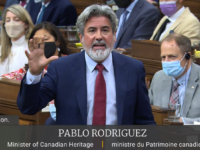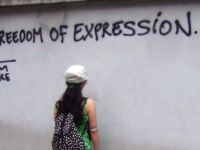Canadian Heritage Minister Pablo Rodriguez is on the defensive as he tries to defend Bill C-18 in the wake of both Google and Facebook signalling that they may remove Canadian news from search results and social media sharing in light of the government’s approach that creates mandated payments for links. Rodriguez appeared on CBC yesterday and had no answers for the questions about what he will do if the companies walk away from news given government estimates that they could be on the hook for 35% of the news expenditures of every news outlet in Canada if they continue to link to their news content. More notably, he contradicted both his own bill and his own department officials when he told Postmedia that “C-18 has nothing to do with how Facebook makes news available to Canadians.” For those who followed months of gaslighting with Bill C-11, this comment will provide a sense of deja-vu since Rodriguez sometimes leaves the impression has only read media lines, rather than his own legislation.
Post Tagged with: "linking"
A Tax on Freedom Of Expression: Report Suggests Bill C-18 Could Be Expanded Even Beyond Mandated Payment for Links
Google was scheduled to appear before the Standing Committee on Canadian Heritage yesterday to discuss Bill C-18 and its test of the removal of links to Canadian news services for a small percentage of its users, but the meeting was postponed due to technical difficulties. That ensured that the big Bill C-18 news of the day did not come from the hearing, but rather from an exceptional Ricochet Media article featuring comments from Senator Paula Simons that should heighten concern about the government’s intent with Bill C-18. Senator Simons, a longtime journalist and Trudeau appointee to the Senate, raises many concerns with the bill (and a great line that “honest to god, I feel that this is written by people who have never used the Internet”), but I think this is the key passage, which opens the door to targets beyond Google and Facebook:
Then there’s the question of what would happen down the road if Google and Facebook were no longer profitable? Simons told Ricochet that when she raised that question with staff in the Heritage ministry, she was told they “would turn to TikTok.”“I said, ‘Wait a minute! TikTok doesn’t share news links,’” Simons recalled. “And staff said, ‘TikTok shares news stories in other ways. It talks about the news.’ I said, ‘Woah, wait a minute! That’s a fair-use argument.’…Then the official said to me, ‘Lots of Canadians get their news from TikTok.’” But, she pointed out, if a content creator on TikTok talks about something they read, that’s not the same as actually sharing a news story.
Why Justin Trudeau is Wrong About Bill C-18 and Google’s Response to Mandated Payments for Links
“It really surprises me that Google has decided that they would rather prevent Canadians from accessing news than actually paying journalists for the work they do. I think that’s a terrible mistake and I know that Canadians expect journalists to be well paid for the work they do.”
Prime Minister Justin Trudeau waded into Bill C-18 and Google removing links to Canadian news articles in search results as part of a test for a small percentage of users yesterday with the quote cited above. At a press conference in Toronto, Trudeau went out of his way to volunteer that he is surprised by Google’s actions, which he thinks is a “terrible mistake.” If Trudeau was surprised, then he has not been paying attention, as the possibility of removing links to news articles in search results or social media has been an obvious consequence of a bill that mandates payments for links. But his surprise isn’t what is important or requires comment. What does is that Trudeau’s comments mislead on several critical issues with Bill C-18.
Elon Musk’s Twitter Linking Restrictions May Have Been Short-Lived, But Bill C-18 is Based on a Similar Approach to Links
The dismantling of Twitter over the past six weeks has been incredibly distressing for millions of users who have come to rely on the platform. From the mass layoffs to journalist suspensions to this weekend’s seemingly short-lived policy blocking some links to rival services, it has been a head-spinning stretch since Elon Musk assumed ownership of the service in late October. In response, many have established a presence on various alternatives: you can now also find me on Mastodon, Post, and Substack. As Twitter users promote these alternatives, on Sunday the company briefly unveiled a new policy that involved removing “accounts created solely for the purpose of promoting other social platforms and content that contains links or usernames for the following platforms: Facebook, Instagram, Mastodon, Truth Social, Tribel, Nostr and Post.” From an operational perspective, this would have meant blocking some links to rival platforms big (Facebook, IG), growing (Mastodon), and small (Post).
Freedom of Expression for a Price: Government Confirms Bill C-18 Requires Platform Payment for User Posts That Include News Quotes and Hyperlinks
The longstanding debate over whether Bill C-18, the Online News Act, requires payment for linking came to an end yesterday. Government officials admitted that even basic quotes from news articles that include a hyperlink to the original source would scope user posts into the law and require platforms such as Google and Facebook to negotiate payment for the links. As noted below, even that position may understate the impact of the bill, which appears to also cover a user post of a news quote without a link. In other words, merely quoting a few sentences from a news article on an Internet platform is treated as making news content available, which triggers a requirement for the platforms to negotiate payment. This position runs counter to Canada’s copyright obligations under the Berne Convention and has no place in a country committed to freedom of expression.











